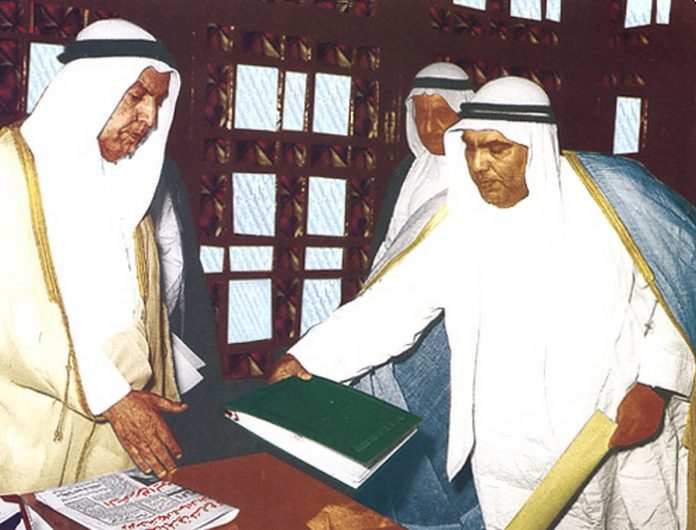In December 1934, the then ruler of Kuwait Sheikh Ahmad Al-Jaber Al-Sabah, signed an agreement with Kuwait OIl Company (KOC), formed by Gulf Oil Corporation (presently Chevron Oil) and the Anglo-Persian Oil Company (presently British Petroleum), to explore for oil in the country.
Primary drilling operations during the 1936-38 period revealed that the land was rich in oil wealth, and in 1938 KOC hit paydirt with the discovery of a huge reservoir of oil in the Burgan Field in southeastern Kuwait. However, further prospecting and oil drilling were suspended with the outbreak of World War II.
Following the end of Second World War and increasing demand for oil, Kuwait began resuming oil drilling activities. On 30 June 1946, Kuwait’s first shipment of oil overseas took place when Sheikh Ahmad Al-Jaber Al-Sabah, in presence of a large contingent of KOC management and other dignitaries, turned a silver wheel to start the flow of over 10,000 tons of crude oil through an offshore pipeline to the oil tanker, ‘British Fusilier’.
One turn of the wheel by Sheikh Ahmad Al-Jaber on that fateful day sealed Kuwait’s emergence as a major global oil producer, a status that has continued unabated for over 75 years. The discovery of oil propelled Kuwait from an insignificant patch of desert land at the northern tip of the Arabian Gulf, into a country of significance in the region and on the international stage.
Starting in the early 1950s a spate of constructions took place in the country with Kuwait building several public utilities, including new roads and a hospital, as well as implementing new development and reformation of local administration. The High Executive Committee was formed in 1954, and the Supreme Council and the Organizational Authority in 1956; local government councils such as the Education Council, City Council and Health Council were also formed.
In 1959 Kuwait also took steps to enact laws and establish systems such as the Naturalization Law in 1959, the Kuwaiti Currency Law, and the Passports Law and the Organization of Government Departments in 1960. During this period, discussions on full independence for the country began to be voiced, and calls for abrogating the protectorate status with Great Britain and transforming Kuwait into a sovereign nation gathered momentum under the leadership of Sheikh Abdullah Al-Salem Al-Sabah.
Sheikh Abdullah Al-Salem Al-Sabah, who had been the chairman of the first parliament in Kuwait in 1938, realized that the protectorate agreement was no longer appropriate after the changes that had taken place in the conditions of Kuwait. The Kuwaiti people were also no longer willing to accept the restrictions imposed by the protectorate agreement.
In line with this thinking among Kuwaitis, Sheikh Abdullah Al-Salem Al-Sabah, expressed his desire to the British government to replace the old protectorate agreement with a new friendship agreement. The British government accepted Kuwait’s demand and diplomatic notes were exchanged between Sir William Luce, the British Political Resident in the Arabian Gulf, and Sheikh Abdullah Al-Salem Al-Sabah. On 19 June,1961 Kuwait was granted full independence.
A draft constitution was approved on 11 November, 1961, outlining Kuwait’s system of governance as a “fully independent Arab State with a democratic style of government, where sovereignty rests with the nation, which is the source of power”. A few months after independence, Sheikh Abdullah Al-Salem, gave instructions for the formation of a popular committee to draft a modern constitution for independent Kuwait. Two months after the formation of the committee, public elections were also held to elect members for the first national assembly in the country.
Government departments were reorganized so as to be able to implement the overall development movement and its plans. Most of the cabinet members were chosen from among the elected members of the national assembly which comprised fifty members. According to the constitution, the national assembly has absolute power to draw the legislative policies and control over the executive authority.
Following the Declaration of Independence, the newly-born state of Kuwait applied formally for membership in the United Nations on 6 July 1961. Also on that day, the United Kingdom submitted a draft resolution by which the Security Council would call upon all States to respect the independence and territorial integrity of Kuwait and urge that all concerned work for peace and tranquility in the area. The UN Assembly, at its fourth special session, endorsed the recommendation by acclamation and on 14 May 1963, Kuwait became the Organization’s 111th Member State.
Kuwait also became an important player in the international family of nations, and with its new-found wealth became a major foreign-aid donor. The Kuwait Fund for Arab Economic Development became active throughout the Arab world and beyond. The country was instrumental in the formation of the Gulf Cooperation Council in 1981, through which the six states of the Gulf support each other in maintaining regional security, stability, and economic development.
Kuwait’s strong standing in the international community came to the forefront in 1990, when following the Iraqi invasion and occupation of Kuwait, the international community came together to overwhelming challenge this and demand that Iraq withdraw its forces immediately. In 1991, when the forces under Saddam Hussein failed to comply with the United Nations’ ultimatum to withdraw and international coalition under the United States helped to drive back the aggressor and ensure Kuwait’s freedom and sovereignty.
Sheikh Abdullah’s role in gaining the country’s independence and in laying the foundation for a strong democratic and constitutional nation, which remains central to the evolution and progress of modern Kuwait, were recognized and acknowledged in 1965, when the country’s National Day was shifted from 6 July to 25 February, the day of Sheikh Abdullah Al-Salem’s accession as Amir of Kuwait in 1950.

















